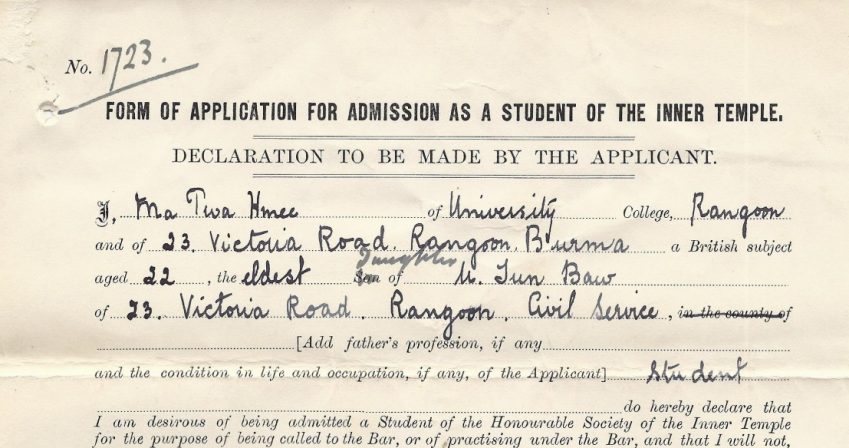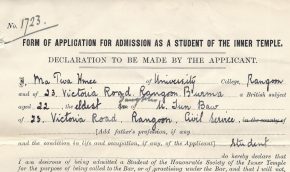First Burmese woman to be called to the Bar, first Burmese woman judge
Celebrating Diversity at the Bar
- Introduction
- Diversity Timeline
- Edward Akufo-Addo
- Obafemi Awolowo
- Joyce Bamford-Addo
- Solomon Brandaranaike
- Charlotte Boaitey-Kwarteng
- Joseph Ephraim Casely Hayford
- Eugenia Charles
- S Chelvan
- Thomas Morris Chester
- Learie Constantine
- Edward Cragg Haynes
- Patricia Dangor
- Coomee Rustom Dantra
- Gifty Edila
- Ezlynn Deraniyagala
- Taslim Olawale Elias
- Martin Forde
- Arthur Dion Hanna
- Ma Pwa Hmee
- Alexander Isbister
- Sibghatullah Kadri
- Seretse Kharma
- Moleleki Didwell Mokama
- Tunde Okewale
- Ashitey Ollennu
- Vallabhbhai Patel
- Lily Tie Ten Quee
- Ponnambalam Ramanathan
- Edward Richards
- Khushwant Singh
- Manjiit Singh Gill
- Teo Soon Kim
- Leslie Thomas
- Stella Thomas
- Leonard Woodley
Home › Celebrating Diversity at the Bar › Ma Pwa Hmee
Ma Pwa Hmee
1902 - 1962
Call 1926, Inner Temple
Ma Pwa Hmee, eldest daughter of a civil servant, was born and educated in Rangoon, Burma. She cut short her studies at Rangoon University and moved to London in 1923, perhaps hoping to become the first Burmese woman at the Bar. In fact, she was admitted to The Inner Temple a week after her compatriot Coomee Rustom Dantra, on 21 January 1924, but was called first in November 1926. One press report emphasised her abilities and commitment to women’s rights:
She is an extremely well-educated woman, as well as being shrewd and quick-witted, and I should be sorry for any wife-beater out in Burma who has to stand in the witness-box and undergo half an hour of her cross-examination.


Ma Pwa Hmee returned to Burma hoping both ‘to work among women’ and to inspire their ambitions, and was admitted to the Burma High Court. In 1928 she was appointed Assistant Judge, becoming Burma’s first woman judge.[1] In 1935, she became an Honorary Magistrate (First Class).
She married U Myint Thein, a fellow lawyer who would become Chief Justice of the Supreme Court in 1957. She was already ill when, following a military coup in 1962, her husband was imprisoned. He was allowed to be with her in her final days only under guard and with his brother taking his place in custody; she died on 26 June 1962.
Caroline Derry with thanks to Li Chen, Seeking “A Fair Field” for Women in the Legal Profession: Pioneering Burmese Portias of 1924-1935 [2020]
[1] Rangoon correspondent, ‘No Title’ Malaya Tribune (Rangoon, 17 August 1928) 11.